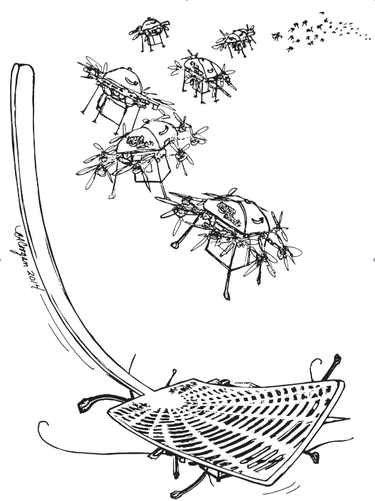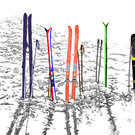Stamp out drone delivery, shop in person
Jeff Bezos has announced to his Amazon customers that his next-generation research and development lab is working on a delivery system “to get packages into customers’ hands in 30 minutes or less using unmanned aerial vehicles.”
The announcement goes on to say, “It looks like science fiction, but it’s real...One day, Prime Air vehicles will be as normal as seeing mail trucks on the road today.”
The online announcement comes complete with a video, showing a customer ordering through a mobile device and pressing the “30 minute delivery button.” The clip then cuts to a massive warehouse with rows and rows and rows of goods stacked high.
A human hand places an item in a plastic box and sets it on a conveyor belt, which whisks the yellow box to a waiting drone. The tiny four-legged drone sails against a blue sky with a whirring noise, then lands on a patio. A man emerges from the house, as a boy watches, and retrieves the package.
This seems like a horror film to us — instant gratification conquering the need for human interaction. Imagine a sky filled with tiny, whirring drones — an ever-present reminder of mankind’s ability to ruin the world.
We have no doubt it could come to pass. Bezos and his company have already reshaped the way our society shops.
But we find value in the old ways — in shopkeepers who not only know their wares, but also know their customers.
In our Progress Edition this week, for example, we interviewed Judd Robinson who is following in his father’s and grandfather’s footsteps at the family’s hardware store in Guilderland. The store’s first customers from 1958 are still shopping there.
On Friday, Judd Robinson shook hands with a customer he called by first name. He and other staff members are knowledgeable and able to help with projects their customers are undertaking.
For those who don’t want to or can’t do projects themselves, we’re carrying news of an independent contractor, Jon Beresford, who writes in our Progress Edition, “Our goal with every job is to develop, or reconfirm, a feeling of mutual trust and respect.”
Beresford takes just one job at a time and describes, with detail, the diligent work he does. A homeowner in Coeymans Hollow has come back to Beresford so many times over the years that he has done work in every room in the house, including the garage and attic.
Care and expertise can’t be shipped by drone.
Crossgates Mall, in its piece, touts its contributions to the community through charities that use the mall for their causes. Crossgates writes that its philosophy is: “There’s more to Crossgates than just shopping. Community events are a priority.”
If shoppers were, instead, waiting in their individual homes for their goods to be delivered by drone to their doors, they would not feel the need or the desire to support such worthwhile charities as Make a Wish Foundation or Ronald McDonald House. They would not hear the Empire State Orchestra Play or see how to safely install car seats for their children.
Physical presence allows human intimacy.
We’ve also profiled two Voorheesville dentists — doctors Steven Lysenko and Danielle Lloyd — who say their goal is to “deliver excellent dental care in a comfortable, relaxing, and friendly atmosphere.”
We’ve written not just about care for people, but for their pets, too. The Guilderland Animal Hospital and the Village Animal Clinic in Voorheesville both offer state-of-the art technology — everything from laser surgery to ultrasounds for pets — but you won’t find it delivered by drone. For animal as well as human care, it is often the personal touch — the knowledge of the practitioner as well as the compassion — that makes all the difference.
When it comes to teaching children, there is no substitute for personal interaction. Stacie Boelkins, the director of the early childhood education at Christ the King in Guilderland says, “Each of the programs is able to adapt to the children’s individual needs.”
We suppose drones could supply goods to meet individual needs quickly and on demand, but something wonderful and serendipitous can happen when children come together and share. They learn to build community. Each can’t instantly have what he wants all to himself. Sometimes there is pleasure and goodness in sharing with another or waiting one’s turn.
The ability to delay gratification is a telling sign of future success. Walter Mischel, a professor at Sanford University, conducted a famous experiment in the 1960s where a child was offered a choice between an immediate small reward, like a marshmallow, or a double reward if she waited for a quarter of an hour. Years of follow-up showed that the kids who were able to wait for their marshmallows went on to be more successful in life; they did better in school, with higher college entrance-exam scores; had more successful careers; and were more physically fit as adults.
Kids at Guilderland Martial Arts are being taught the value of work now for success later. Everyone on the team placed in the top 10 in national competition last year.
“It’s a huge accomplishment,” said Master Robert Rice, the school’s director. “I’m most proud of the work they put in to prepare. Taekwondo isn’t a team sport, but we feel like a team. There were some late hours, and some early hours, too.”
Coming together isn’t always for work; sometimes it is for fun as anyone knows who has been to the Altamont Fair. The fair serves as a showcase for myriad talents: singing and dancing, baking and sewing, painting and raising flowers, making scarecrows and raising vegetables; and showing all manner of farm animals.
Volunteers spend countless hours to make the fair a success each year. The results reflect not just individual progress but the community’s pride.
Society often moves forward best when people come together for work and for play.
We know we have a bias because The Enterprise itself is a mom-and-pop business; and we, too, are profiled in the Progress Edition. Beyond the frequently heard slogan of “shop locally” is a bedrock truth: If we stop supporting what is local, we’ll have lost it.
We at The Enterprise gather local news each week, which informs and cements the community.
We urge our readers to read our Progress Edition and think about the progress of the human race: What serves us best? Materialism and instant gratification? Or supporting those in our midst and benefitting from their expertise to form a rich community?
— Melissa Hale-Spencer


